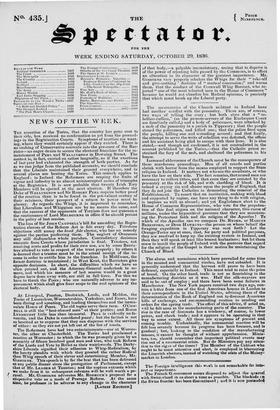The alarm and uneasiness which have prevailed for some time
in the monied and commercial circles, have not subsided. It is generally understood that the harvest will prove to have been deficient, especially in Ireland. This must tend to raise the price of bread. On the other hand, trade is not so flourishing in the manufacturing districts as it was. Half the silk-weavers are said to be out of employ ; and there have been some failures in Manchester. The New York papers received two days ago, con- tain a letter from one of the first American houses in London to their correspondents in the United States, advising them of the determination of the Bank of England not to discount American bills of exchange, and recommending caution in sending out orders for the spring trade. The effect of this advice, if acted on, %%ill be felt soon in the manufacturing parts of the country. The rise in the rate of discounts has a tendency, of course, to lower prices, and check trade ; and it appears to be operating in that way to some extent. All these are symptoms of present anti coming trouble. Undoubtedly, the commercial reaction will be felt less severely because its progress has been foreseen, and is gradual ; but, looking to the condition of the manufacturing masses, it cannot be thought of without apprehension. Minis- ters, too, should remember that important political events may rise out of a commercial crisis. But do Ministers pay Any atten- tion to the signs of the times? The Member of the Cabinet who ought to be most attentive and alert, is employed in blarneying the Limerick electors, instead of watching the state of the Money- market in London.


























